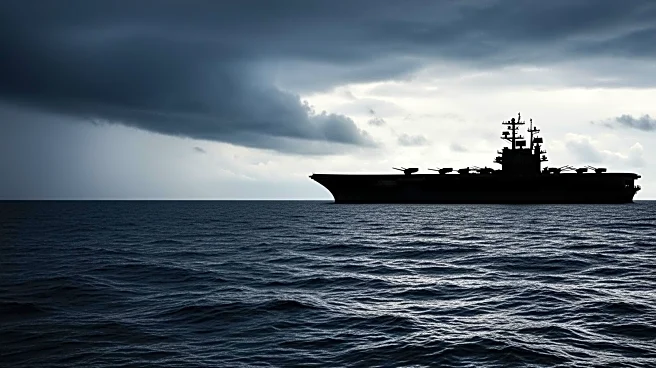What's Happening?
North Korea's defense minister, No Kwang Chol, has issued a warning in response to the arrival of the USS George Washington aircraft carrier and the Fifth Carrier Strike Group at a port in Busan, South Korea. The minister stated that North Korea would
take 'more offensive action' against perceived threats, emphasizing the principle of ensuring security and defending peace through powerful strength. This development follows North Korea's recent launch of a short-range ballistic missile into the sea off its east coast. The missile launch coincided with new sanctions imposed by Washington targeting North Korean nationals and entities involved in money laundering tied to cybercrimes. The arrival of the US strike group also aligns with large-scale joint military drills, known as Freedom Flag, between US and South Korean forces.
Why It's Important?
The tensions between North Korea and the United States, along with South Korea, have significant implications for regional security and international relations. North Korea's threats and missile tests could destabilize the region, affecting diplomatic efforts and military strategies. The presence of US military forces in South Korea is a critical component of the US-South Korea alliance, aimed at deterring North Korean aggression. However, North Korea views these actions as hostile, potentially escalating military confrontations. The situation impacts global security dynamics, influencing US foreign policy and defense strategies in the Indo-Pacific region. Stakeholders, including neighboring countries and international organizations, are closely monitoring these developments.
What's Next?
The ongoing military drills and the presence of US forces in South Korea may lead to further provocations from North Korea. Diplomatic efforts to de-escalate tensions could involve negotiations or increased sanctions. The US and South Korea may continue to strengthen their military alliance, focusing on deterrence strategies. International reactions, including from China and Japan, could shape future diplomatic engagements. The situation remains fluid, with potential for both diplomatic resolutions and military escalations.
Beyond the Headlines
The confrontation between North Korea and the US-South Korea alliance highlights broader geopolitical challenges in the region. The military presence and exercises underscore the strategic importance of the Korean Peninsula in global security. Ethical considerations arise regarding the impact of military actions on civilian populations and regional stability. Long-term shifts may include changes in military alliances and defense policies, influencing global power dynamics.
















